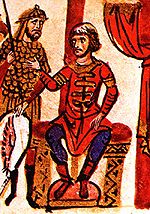Omurtag

Omurtag was Khan of the Bulgarians from 814 to 831 .
Life
Omurtag's father was the Bulgarenkhan Krum . After Krum's death, his brothers followed for a short time, who are called Dukumos and Ditzeugos in Byzantine sources .
Probably after 814 there were harsh reprisals against the Christian-Byzantine population who lived in the Bulgarian territory. However, it is unclear whether the anti-Christian measures came from Omurtag or his direct predecessor Ditzeugos. In any case, in the Byzantine sources there are reports that Christians in Thrace were given the choice of breaking the meat prohibition of Lent or to die. 14 men eventually suffered martyrdom. Other sources report massacres of prisoners.
In some sources, Omurtag is directly held responsible for the anti-Christian measures, but relations with Byzantium relaxed in the period that followed. From this it can perhaps be deduced that Omurtag did not continue the measures taken by his predecessor, but the sources do not allow any reliable statement. In any case, Omurtag concluded a peace treaty limited to 30 years with the Byzantine emperor Leon V in late 815 or early 816. In fact, this treaty ushered in a phase of rapprochement between Bulgaria and Byzantium, and Omurtag adhered to the contractual obligations. He also supported Emperor Michael II in the fight against the usurper Thomas .
In 818 Slavic tribes in the Danube - Tisza region turned to the Frankish Empire . They complained to Emperor Ludwig the Pious that their previous rights had been curtailed after reforms in the Bulgarian Empire. Omurtag attempted a diplomatic solution for this area in letters of 824 and 826. The letters probably went unanswered. In 827 he conquered the area along the Save to Sirmium and finally incorporated it into his domain in 829.
Perhaps while Omurtag was still alive there was a contractual border regulation between Franks and Bulgarians.
The Byzantine influence also had an impact on Omurtag's building activities (for example in the capital Pliska ), and Greek inscriptions from this period have been preserved. The end of this development was the final Christianization of Bulgaria half a century later. Omurtag pursued an overall successful centralization policy towards the nobility. Omurtag was succeeded by his youngest son Malamir , who had tough anti-Christian policies.
He has been the namesake of the Omurtag Pass on Livingston Island in Antarctica since 2005 .
literature
- Omurtag . In: Prosopography of the Middle Byzantine Period : First Division (641–867) . After preliminary work by Ralph-Johannes Lilie , Claudia Ludwig, Thomas Pratsch, Ilse Rochow, Beate Zielke. Vol. 3, Berlin 2000, pp. 484-486 (with references).
- Veselin Beševliev : The Proto-Bulgarian Period of Bulgarian History . Amsterdam 1981.
- Mark Whittow: The Making of Byzantium . Berkeley 1996, pp. 278ff.
- Detlef Kulman: Omurtag , in: Biographical Lexicon for the History of Southeast Europe . Vol. 3. Munich 1979, pp. 352-354
Web links
| predecessor | Office | successor |
|---|---|---|
| Krum |
Khan of Bulgaria 814-831 |
Malamir |
| personal data | |
|---|---|
| SURNAME | Omurtag |
| BRIEF DESCRIPTION | Khan of the Bulgarians |
| DATE OF BIRTH | 8th century |
| DATE OF DEATH | after 831 |
